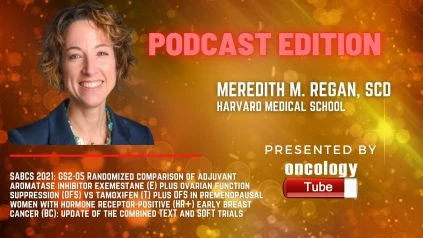Meredith M. Regan, ScD, Associate Professor of Medicine, Dana-Farber Cancer Institute/Harvard Medical School speaks about the SABCS 2021 Abstract – GS2-05 Randomized comparison of adjuvant aromatase inhibitor exemestane (E) plus ovarian function suppression (OFS) vs tamoxifen (T) plus OFS in premenopausal women with hormone receptor-positive (HR+) early breast cancer (BC): update of the combined TEXT and SOFT trials.
Link to Abstract:
https://www.sabcs.org/Portals/SABCS2016/2021%20SABCS/SABCS21_embargoedAbstracts_111921.pdf?ver=2021-11-19-141323-927
Background:
After 9 years of median follow-up (MFU), the updated combined SOFT+TEXT analysis demonstrated that adjuvant E+OFS vs T+OFS increased disease-free survival (DFS) and distant recurrence free interval (DRFI), but not overall survival (OS), in premenopausal women with HR+ early BC (Francis et al NEJM 2018). Given the high percentage of OS in both groups and the long-term risk of recurrence in HR+ BC, treatment benefit must be assessed over time. We present a scheduled update analysis, which includes the operating system and a database lock date of May 2021, following 13 years of MFU.
Methods From November 2003 to April 2011, TEXT and SOFT included premenopausal women with HR+ early BC (2660 in TEXT, 3047 in SOFT ITT populations). Women were randomized to 5 years E+OFS vs T+OFS within 12 weeks of surgery in TEXT; chemotherapy (CT) was optional and given concurrently with OFS. Within 12 weeks of surgery if no CT was planned, or within 8 months of finishing (neo)adjuvant CT, SOFT randomized women to 5 years E+OFS vs T+OFS vs T alone. The use of CT was stratified in both trials. The primary outcome for the combined E+OFS vs T+OFS analysis was DFS, which was defined as invasive local, regional, distant recurrence, contralateral BC, second malignancy, and death. Invasive breast cancer-free interval (BCFI), DRFI, and overall survival (OS) were used as secondary goals.
Results:
There were 953 DFS episodes and 473 fatalities among 4690 pts assigned to T+OFS or E+OFS at database lock. DFS, BCFI, and DRFI outcomes for pts assigned E+OFS (n=2346) remained to be significantly better than T+OFS (n=2344) in the ITT population. The 12-year DFS was 80.5 percent vs. 75.9% (a 4.6 percent absolute improvement; HR 0.79 95 percent CI 0.70-0.90), the 12-year BCFI was 4.1 percent higher, and the 12-year DRFI was 1.8 percent higher. OS was outstanding in both groups at 12 years, with 90.1 percent of pts allocated E+OFS and 89.1 percent of pts assigned T+OFS having excellent OS (HR 0.93; 95 percent CI, 0.78-1.11). According to HER2 status, the relative therapy effect was heterogeneous. Anti-HER2 adjuvant therapy was not typical when enrolment began, therefore 53 percent of 583 patients with HER2+ malignancies got HER2-targeted therapy. As an example of a high-risk feature, Kaplan-Meier 12-year estimates for patients with HER2 negative tumors by trial and treatment strata, as well as for those with high-grade tumors, are shown below (Table). In patients with HER2 negative tumors who underwent chemotherapy in both trials, there appears to be an OS benefit for E+OFS vs T+OFS. Clinically relevant outcome gains were also reported in other high-risk subgroups in patients with HER2-negative tumors: In patients with pN1a disease, 12-year DFS and OS were improved by 7.4% and 2.7 percent, respectively, and by 10.6% and 4.5 percent, respectively, in those with tumors >2cm.
Conclusions:
Adjuvant E+OFS, as opposed to T+OFS, showed a sustained reduction in the risk of recurrence after 13 years MFU, which is more consistent in HER2 negative patients and those with high-risk disease features, such as adjuvant chemotherapeutic indication and G3 tumors. Oncologists can utilize this material to talk to their patients about the possible benefits of E+OFS. The follow-up will continue for another five years.

